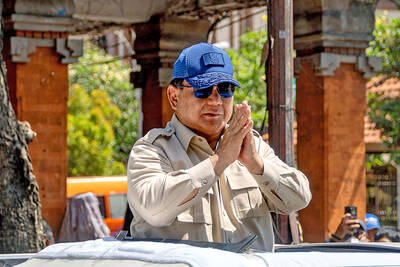Black wolves, found nearly exclusively in North America, likely inherited their coats from breeding with domestic dogs, a study published on Thursday showed.
The dogs of the earliest Native Americans or of European immigrants probably contributed to the genetic variability of their wild counterparts, researchers from Stanford University and the University of Calgary found in a study published in the journal Science.
Most canine geneticists believe that North American dogs today are all descended from European dogs, the study said.
“Although it happened by accident, black wolves are the first example of wolves being genetically engineered by people,” said study co-author Marco Musiani, a University of Calgary professor and wolf expert.
“Domestication of dogs has led to dark-colored coats in wolves, which has proven to be a valuable trait for wolf populations as their arctic habitat shrinks,” Musiani said.
A darker coat helps wolves hide when chasing their prey in forested areas, where the black wolves make up about 62 percent of the wolf population. Wolves gray with age, and coats vary from white to gray to black.
Lighter-colored wolves are more prevalent in the icy tundra, where only about 7 percent of dark wolves are found.
“I have spent a lot of time in tree-line areas at the southern edge of the tundra and it has always surprised me that there are white wolves and black wolves but no gray wolves in these areas,” Musiani said. “This work may provide an explanation: Wolf populations are quickly adapting to conditions with less snow by taking advantage of the human-created shortcut of black coloration.”
The researchers said the wolves acquired their dark coats at some point over the past 10,000 to 15,000 years, after the first humans migrated to North America across the Bering Strait with their dogs.
The study compared DNA from 41 black, gray and white wolves in the Canadian Arctic and 224 black and gray wolves in Yellowstone National Park with the DNA of domestic dogs and gray and black coyotes.
The researchers set out to explain how pigmentation in dogs differs from most other mammals, but instead discovered the genetic mutation that accounts for wolves’ pigmentation.
“Wildlife biologists don’t really think that wolves rely much on camouflage to protect themselves or to increase their hunting success,” genetics professor Greg Barsh said.

DEADLOCK: Putin has vowed to continue fighting unless Ukraine cedes more land, while talks have been paused with no immediate results expected, the Kremlin said Russia on Friday said that peace talks with Kyiv were on “pause” as Ukrainian President Volodymyr Zelenskiy warned that Russian President Vladimir Putin still wanted to capture the whole of Ukraine. Meanwhile, US President Donald Trump said that he was running out of patience with Putin, and the NATO alliance said it would bolster its eastern front after Russian drones were shot down in Polish airspace this week. The latest blow to faltering diplomacy came as Russia’s army staged major military drills with its key ally Belarus. Despite Trump forcing the warring sides to hold direct talks and hosting Putin in Alaska, there

North Korea has executed people for watching or distributing foreign television shows, including popular South Korean dramas, as part of an intensifying crackdown on personal freedoms, a UN human rights report said on Friday. Surveillance has grown more pervasive since 2014 with the help of new technologies, while punishments have become harsher — including the introduction of the death penalty for offences such as sharing foreign TV dramas, the report said. The curbs make North Korea the most restrictive country in the world, said the 14-page UN report, which was based on interviews with more than 300 witnesses and victims who had

COMFORT WOMEN CLASH: Japan has strongly rejected South Korean court rulings ordering the government to provide reparations to Korean victims of sexual slavery The Japanese government yesterday defended its stance on wartime sexual slavery and described South Korean court rulings ordering Japanese compensation as violations of international law, after UN investigators criticized Tokyo for failing to ensure truth-finding and reparations for the victims. In its own response to UN human rights rapporteurs, South Korea called on Japan to “squarely face up to our painful history” and cited how Tokyo’s refusal to comply with court orders have denied the victims payment. The statements underscored how the two Asian US allies still hold key differences on the issue, even as they pause their on-and-off disputes over historical

CONSOLIDATION: The Indonesian president has used the moment to replace figures from former president Jokowi’s tenure with loyal allies In removing Indonesia’s finance minister and U-turning on protester demands, the leader of Southeast Asia’s biggest economy is scrambling to restore public trust while seizing a chance to install loyalists after deadly riots last month, experts say. Demonstrations that were sparked by low wages, unemployment and anger over lawmakers’ lavish perks grew after footage spread of a paramilitary police vehicle running over a delivery motorcycle driver. The ensuing riots, which rights groups say left at least 10 dead and hundreds detained, were the biggest of Indonesian President Prabowo Subianto’s term, and the ex-general is now calling on the public to restore their